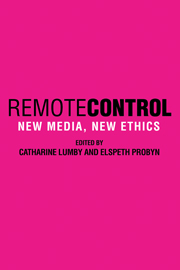Book contents
- Frontmatter
- Contents
- List of Contributors
- Acknowledgements
- 1 Introduction: An Ethics of Engagement
- 2 Real Appeal: The Ethics of Reality TV
- 3 Arguing about Ethics
- 4 ‘Their own media in their own language’
- Beyond the Disconnect: Practical Ethics
- 5 A Viable Ethics: Journalists and the ‘Ethnic Question’
- 6 Ethics, Entertainment and the Tabloid: The Case of Talkback Radio in Australia
- Money versus Ethics
- 7 Eating into Ethics: Passion, Food and Journalism
- Beyond Food Porn
- 8 Ethics impossible? Advertising and the Infomercial
- Pitching to the ‘Tribes’: New Ad Techniques
- 9 Diary of a Webdiarist: Ethics Goes Online
- 10 Control-SHIFT: Censorship and the Internet
- Representing the Asylum Seekers
- 11 The Ethics of Porn on the Net
- Ethics and Sex
- 12 Grassroots Ethics: The Case of Souths versus News Corporation
- 13 Great Pretenders: Ethics and the Rise of Pranksterism
- The Limits of Satire
- Index
Beyond the Disconnect: Practical Ethics
Published online by Cambridge University Press: 18 December 2009
- Frontmatter
- Contents
- List of Contributors
- Acknowledgements
- 1 Introduction: An Ethics of Engagement
- 2 Real Appeal: The Ethics of Reality TV
- 3 Arguing about Ethics
- 4 ‘Their own media in their own language’
- Beyond the Disconnect: Practical Ethics
- 5 A Viable Ethics: Journalists and the ‘Ethnic Question’
- 6 Ethics, Entertainment and the Tabloid: The Case of Talkback Radio in Australia
- Money versus Ethics
- 7 Eating into Ethics: Passion, Food and Journalism
- Beyond Food Porn
- 8 Ethics impossible? Advertising and the Infomercial
- Pitching to the ‘Tribes’: New Ad Techniques
- 9 Diary of a Webdiarist: Ethics Goes Online
- 10 Control-SHIFT: Censorship and the Internet
- Representing the Asylum Seekers
- 11 The Ethics of Porn on the Net
- Ethics and Sex
- 12 Grassroots Ethics: The Case of Souths versus News Corporation
- 13 Great Pretenders: Ethics and the Rise of Pranksterism
- The Limits of Satire
- Index
Summary
I want to begin by asking you about the role of the current affairs interviewer. In conventional print media terms the news journalist is objective and the opinion writer is subjective. Where does the interviewer sit on that spectrum?
I think in newspapers those two roles are blurred. To give a recent example, we had Paul Kelly on the front page [of the Australian] with a news story based on an interview with the Prime Minister. It was about the prospect of war with Iraq. But Kelly's commentary was in there as well. We have a lot of that in Australian journalism. Certainly, when it comes to the role of the TV interviewer, I'd say absolutely both those roles are crunched.
You are always looking to get a news line out of it – I am anyway. What I find far more problematic is the tedious sort of formulaic posture of interviewer as almost feral aggressor, which results in the interviewee becoming defensive and saying nothing. I think the more productive middle ground is the interviewer as information seeker, prepared to be combative and who will come back, with alternate views, or press for a direct response. I find that much more likely to yield fresh information which the viewer can take away, and say:‘Yes, I got something out of the ten minutes’. A lot of radio interviews irritate me because it's a case of: ‘We're now going to have X who is going to interrupt Minister Y for the next seven and a half minutes’ and not a shred of information comes out of that.
- Type
- Chapter
- Information
- Remote ControlNew Media, New Ethics, pp. 67 - 73Publisher: Cambridge University PressPrint publication year: 2003

